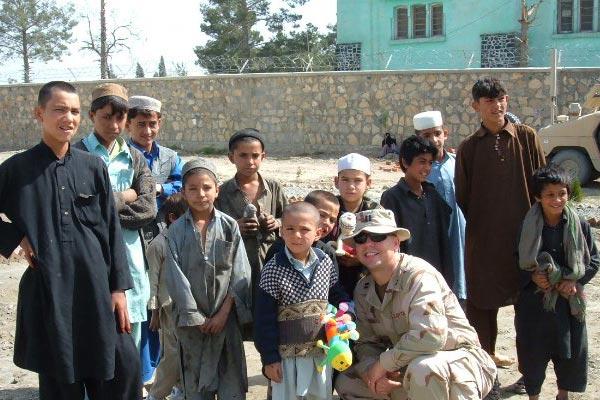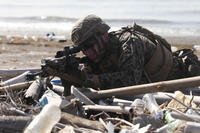I met Bill Cabaniss on my first experimental deployment while a student at the Air Force Academy. He was a physician's assistant and allowed me to work with the aeromedical evacuation team. Below, he outlines the top 10 things he has learned from deployment.
- Camaraderie is essential
- Democracy is not a strong fit for all cultures
- You have the ability to change the attitudes of the people you serve
- Family support keeps you going
- Friendships made while deployed last a lifetime
- We all want some common basic things in life
- Money thrown at problems does not necessarily fix them
- Self-actualize and do the things you were trained to do
- Accept the fact that you can die at any moment
- Life is fragile
1. Camaraderie is essential.
I cannot emphasize enough how camaraderie is essential while deployed. It is the cornerstone and foundation of getting things done in the atmosphere of deployment. You are in a position with very limited manpower, so everyone has to rely on each other at all times, even during downtimes.
I always went out of my way to form great working relationships with personnel in every function of a forward operating base. This helped to form an informal network of support and structure. As a medical officer, I was also interested in the health of all of the staff at my deployed site. Reaching out to these folks and making sure I took care of their needs, and was genuinely interested in them, provided a strong network that brought intangible benefits.
In a deployment atmosphere you have to get to know your colleagues, on personal levels at times, to understand the strengths and weaknesses of those you go out on convoys and missions with. Everybody brings different skills and value to the table. When you nurture and support your comrades, you provide a support structure that makes people excel and perform to the best of their ability.
2. Democracy is not the right fit for all cultures.
In a world of increased violence and instability, as well as varied long-standing cultural and ethnic values, it is a challenge for our nation to push the tenets of democracy on others. Idealistically, on paper, governance by the people is a viable solution to secure and insure freedom for all. However, implementing these ideals at the ground level is often fraught with complication and misunderstanding. That reality must be accepted and embraced by the culture we are encouraging to shift towards democracy before it is effective.
Often, I saw that certain cultures' history and traditional governmental structures were not necessarily conducive to a change for democracy. I believe our government has been somewhat arrogant to believe that we can easily bring democracy to a struggling nation and have it be widely accepted without challenge. I feel that an approach that would better serve foreign nations would be to offer structural and social stability while allowing the citizens of certain nations to adopt their own form of government in the name of freedom.
3. My small role in affecting a change of attitude in the people I served with.
Being a medical officer in a deployed environment gave me the unique opportunity to engage people of a variety of different nations. Providing medical treatment for them and their families allowed me to open doors and uncover the real struggles and needs of people in war-torn nations.
I feel that, in my small role as a medical officer, I was able to win the hearts and minds of many. It is unfortunate that in today's world, the media focuses on violence and oppression in a war environment while often ignoring the humanitarian and social benefits provided to citizens of war-torn nations.
Many of the citizens that I engaged with were fearful of me leaving – they actually wanted me to stay. This helps me validate the fact that I was able to be a positive ambassador of our nation to these people. Providing the citizens reassurance and support has given me immeasurable satisfaction that I will always be proud of and has no dollar amount attached to it.
4. Family support keeps you going.
A key foundation of my ability to perform well in a deployed environment was my family's support. Without the emotional foundation they provided, I do not believe I could have performed as well as I did in the deployed environment. They provided small things that kept me going like short phone calls, snacks from home, and humanitarian goods that helped me win the hearts and minds of local citizens. It's amazing to see the looks on people's faces when they are given gifts from another country, and to know it was given personally from my own family and friends, as well as other donors. Knowing you have a family support structure at home also gives you peace and reassurance that allows you to focus on the mission, and the ability to get the job done.
5. Friendships made while deployed last a lifetime.
Friendships made while enduring a common struggle have historically tended to be stronger and longer lasting than any other. You all have a common bond, and you tend to rely on each other more in a war environment than you would at home in a secure environment. The level of trust in these relationships is always greater as you realize that the person next to you may have to save your life, or you may have to save theirs, at any given time.
Enduring a struggle together makes you more appreciative of each other. Some of the best friendships of my life were made while deployed. However, I also had to endure the pain of losing some of these friends after they were killed in action. For me, this is one of the hardest things I had to endure.
6. Even though everyone is different, we all want certain basic things in life.
During multiple deployments I learned that even though we may all be different culturally, we all want the same guarantees of freedom and security. We all want freedom from violence and oppression. We all want to be loved and respected. No matter what race, ethnicity, or cultural values that divide us, we all have the same basic desires. These basic needs unite us all as humans, and reveal how common we all are in this world.
7. Money thrown at problems does not necessarily fix them.
As a nation, we sometimes think that if we spend a lot of money on a problem it will resolve or go away. In my experience, this is not always true. Sometimes money can help, but it can often inspire dependency and corruption. Money spent on training and materials often did not attain the desired effect. I saw this firsthand while deployed with relapses in training and less-than-optimal proficiency.
I believe a lot of this lack of proficiency was due to cultural and ethnic values, as well as limited manpower and logistical support. Materials often seem to be misappropriated or misused for personal gain or corrupt purposes.
8. I was able to self-actualize and do the things I was trained to do.
I obtained immeasurable satisfaction while serving in a deployed environment. I was also able to serve my country in an honorable way by utilizing my medical skills to save lives and deliver healthcare to those truly in need. There is no greater satisfaction for me than saving somebody's life or seeing happiness and reassurance on the faces of citizens of a war-torn nation after taking care of their most basic healthcare needs. Especially since these needs would have never been fulfilled had we not been there.
What was even more satisfying was the immense appreciation that they conveyed when I took care of them. Providing medical care for these citizens is a positive impact on their lives that lasts for decades. For me, it was satisfying to rise to the challenge and perform tasks that I never thought I would have to perform in a stressful and dangerous environment. It was also reassuring to know that I was given all the tools that I needed to perform at this optimal level.
9. Accepting the fact that I could die at any moment.
Everyone is fearful of death at some time in their life. Surprisingly, I took it in great stride. After experiencing a couple of dangerous situations, I was able to let go of my fear of death. My only wish was that if I did die, that I would die doing my job to the best of my ability.
Admittedly, I had some fear of death when I was deployed to Afghanistan. However, once I accepted the fact that I could die at any moment, I found myself going above and beyond and performing at a higher level than I have ever performed in my life. Often I saw my colleagues who were fearful of death unable to perform at an optimal level. I encouraged them to accept death as a possibility, and often once they did accept the possibility of death, they also performed at a higher level. I believe this is one of the biggest challenges that most of us face when we deploy.
10. Life is fragile.
This has multiple meanings to me. Not only is living life sometimes fragile, it can also be taken away at a moment's notice no matter how strong or perseverant we are. It can make the confident doubtful, it can make the strong weak, it can make the most joyous person sad.
My deployed experiences allowed me to see the best and worst of the fragility of life. Seeing this firsthand not only inspired me at times but also depressed me at times. Sometimes I was able to positively affect the fragility by saving the lives of others or improving their health.
Sometimes, however, the fragility was out of my control and I endured the death of my friends and others and watched many go through states of depression, fear, and anxiety. I realized at times that life can be cyclical, unpredictable, and sometimes random. I realize that there are no guarantees in life, and despite some of our best efforts, bad things do happen.
It takes perseverance, focus, and unwavering flexibility to handle life's often fragile nature. Overall, this has given me a greater appreciation for my own life while realizing that anything can change in a moment's notice.





















